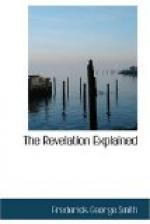Ammianus Marcellinus, a Roman historian, who lived during these times, adverting to this subject, says: “It was no wonder to see those who were ambitious of human greatness, contending with so much heat and animosity for that dignity, because when they had obtained it, they were sure to be enriched by the offerings of the matrons, and of appearing abroad in great splendor, of being admired for their costly coaches, and sumptuous feasts, outdoing sovereign princes in the expenses of their table.” This led Proetextatus, a heathen, who was praefect of the city, to say, “Make me bishop of Rome, and I’ll be a Christian too!”
Speaking of the period now under consideration, Eusebius, “the father of church history,” “mentions one Paul, who was at this time bishop of Antioch; who lived in luxury and licentiousness, and who was a teacher of erroneous doctrines, and usurped so great authority that the people feared to venture to accuse him. In the conclusion of the same chapter in which this is found, he shows that after a general council was held at Antioch, this Paul was excommunicated and robbed of his bishopric by the bishops of Rome and Italy; from this it appears that they possessed an authority still greater than that usurped by Paul.” The following are his words: “Paul, therefore, having thus fallen from the episcopate, together with the true faith as already said, Domnus succeeded in administration of the church at Antioch. But Paul being unwilling to leave the building of the church, an appeal was made to the emperor Aurelian, who decided most equitably on the business, ordering the building to be given up to those whom the Christian bishops of Italy and Rome should write.” Eccl. History, Book VII, Chap. 30. The Encyclopaedia Britannica says that this council at which Paul was excommunicated was held “probably in the year 268,” and that “Paul continued in his office until the year 272, when the city was taken by the emperor Aurelian, who decided in person that the church-building belonged to the bishop who was in epistolary communication with the bishops of Rome and Italy.” Vol. XVIII, p. 429.
The above extracts show not only the development of error in the church, but also the great power already obtained by the hierarchy. Geo. Fisher says, “The accession of Constantine [A.D. 312] found the church so firmly organized under the hierarchy that it could not lose its identity by being absolutely merged in the state.” History of the Christian Church, p. 99.
In the year A.D. 270 Anthony, an Egyptian, the founder of the monastic institution, fixed his abode in the deserts of Egypt and formed monks into organized bodies. “Influenced by these eminent examples [Anthony, Hilarion, et al.] immense multitudes betook themselves to the desert, and innumerable monasteries were fixed in Egypt, Ethiopia, Lybia and Syria. Some of the Egyptian abbots are spoken of as having had five, seven, or even ten thousand monks under their personal




